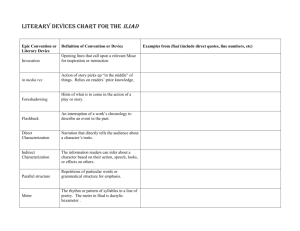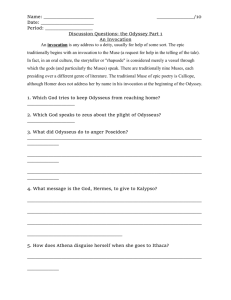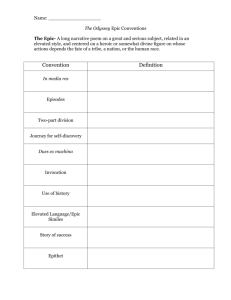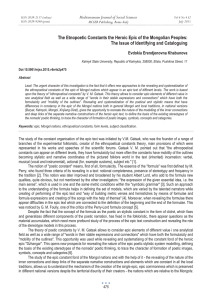Odyssey Intro PowerPoint
advertisement
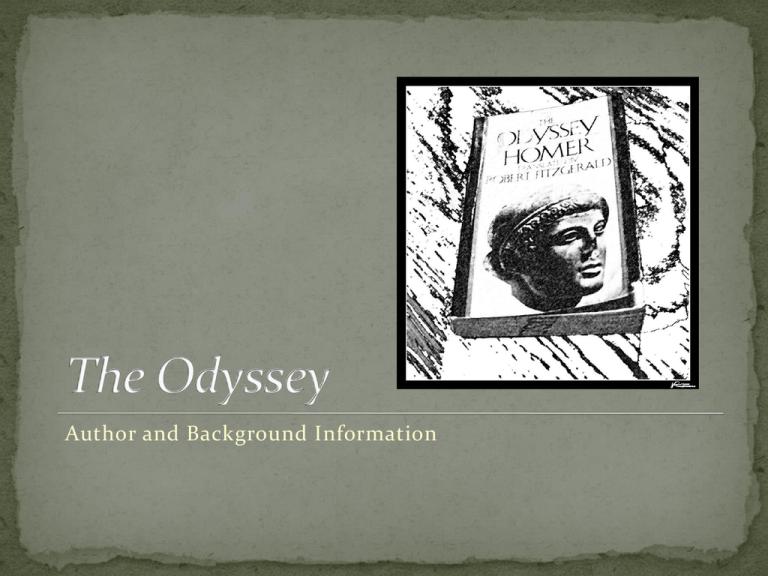
Author and Background Information Simple: The Fate of a Nation. (Ithaka, to be precise) Witty Strong and well built Handsome and does quite well with the women. Intelligent Manages to get out of bad situations with his cleverness. He appears superhuman, yet flawed. His wife, Penelope. His son, Telemachus. Suitors: This is a term for people who court or try to woo another. Eurykleia, Odysseus and Telemakhos’ nurse Laertes, Odysseus’ father. His Crew Many others as he travels; keep track of who is who and who is connected/related to whom. It will save you lots of re-reading! Akhaians or Danaans = the Greeks. You will hear Telemakhos call to them or criticize them. It is just another name of the Greeks to distinguish them from the Trojans. This takes place in Greece and throughout the Mediterranean world. Time estimates for this journey are varied Most scholars place the story telling to be over 3,000 years old. Talk about writing a 3,000-year-best-seller! Phew! Epic poet begins in the middle of the action – “in-medias res” Tells significant prior events through flashback Begins with an invocation to the muses (Calliope is muse of epic poetry) Each line is the same poetic meter (dactylic hexameter!) In-media res Invocation of the muses Epic Poetry Poetic meter Flashbacks and repetition Some things you are familiar with: • • • • similes and metaphors epithets symbols and omens repetition This is a function of the fact that this was a STORY TOLD ORALLY • Some things you may not be so familiar with: • long speeches and little dialogue • catalogues • great listing of people, especially in battle sequence • Digressions • Moving away from the topic at hand to discuss something related, often from the past or tied to the matter at hand in some way, but still off topic. (The phrase, “And I digress” means you’ve gotten away from your point.) Dactylic Hexameter = a form of poetic meter or rhyme scheme The meter consists of lines made from six ("hexa") feet. A “dactyl” is a long syllable followed by two short syllables, as determined by syllable weight. A useful mnemonic for remembering this long-short-short pattern is to consider the relative lengths of the three bones of a human finger: beginning at the knuckle, it is one long bone followed by two shorter ones (hence the name "dactyl"). 1. Creation of characters with uncomplicated motives 2. Actions that are true to Human Nature 3. Plots that blend the joys of living with the tragic sense of life. 4. Long, musical lines (in the original Greek or in a poetry translation) people of importance to society national hero monsters - for the purpose of playing up the good traits of the hero fate of a nation (ex. Ithaca) setting of worldwide scope (ex. Mediterranean world) journeys or quests tests for the hero divine intervention intelligent and clever courageous strong and well built performs heroic feats wants to defeat evil adventuresome manages to get out of every bad situation using his cleverness faithful to family, country and gods These are the lasting and enduring lessons we aim to take from this reading: 1. The Oral Tradition and its devices were used to explain and teach natural and religious origins, political origins, history of culture, and acceptable behavior for society. 2. Understanding how an epic poem is structure and the devices it employs enables full appreciation of its message. 3. Epic heroes are both courageous, intelligent leaders and flawed humans; they reflect the culture from which they emerge. 4. An odyssey takes one well beyond the familiar geography and explore the boundaries of human psyche and human society both literally and figuratively. 5. An individual’s understanding of self, his interaction with others and the world form his identity. 6. Home is a vital link to one's past, present, and future. Let’s read the opening together to get a feel for the dactylic hexameter!
